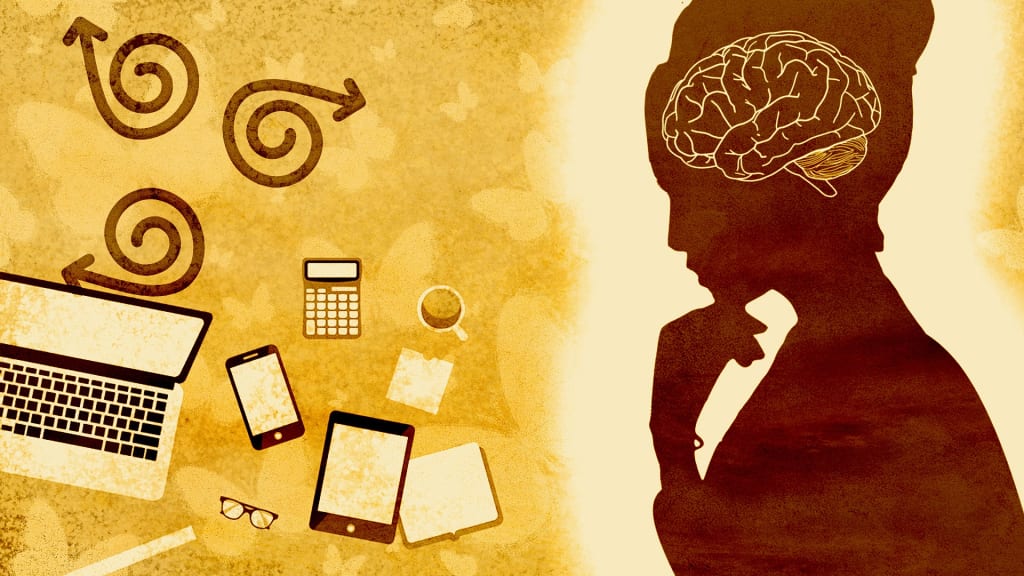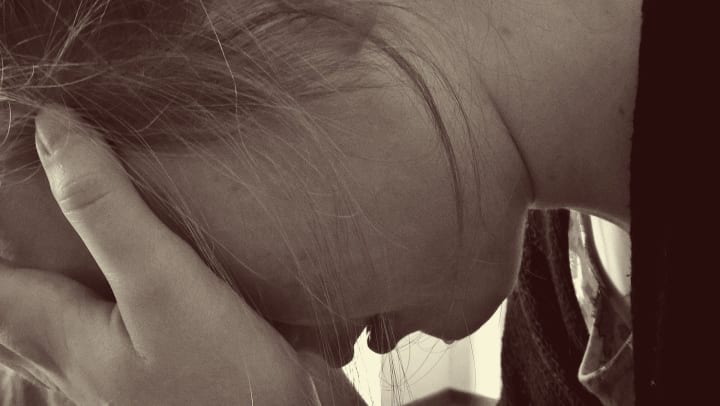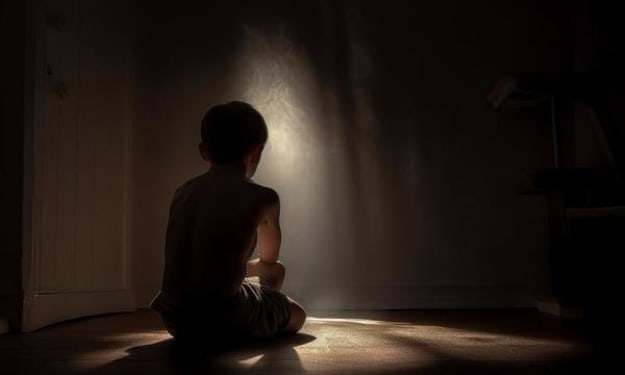When Words Become Triggering
It's best to think before you speak, especially when it comes to the realm of mental illness talk.

Words are often one of our leading guideposts when it comes to interacting with each other in society. Non-verbal gestures may be what we first come to know—such as smiling when faced with something pleasurable—but we can often express ourselves best through the use (and nuance) of language.
But language is a convoluted thing. Definitions can vary depending on the word, but intent can also be a factor behind even the simplest conversations. What do we mean when we are using this word to describe that person?
When it comes to the realm of mental health awareness, I tend to dwell on language a lot myself. Too often I've heard things said in anger or in jest, and a lot of it straight-up makes me give pause. Below, I've shared some phrases and words that came to the forefront of my mind regarding conversations I've heard or even things I myself have said at some point.
The point being: sometimes we have to stop and examine what we say and to whom we say it.
"He's so cray-cray, you know?"

There's a little girl I know who got into the habit of using the term "cray-cray" in regards to her grandfather, much to the delight of many of the relatives around her. They would chuckle with the "gosh, she's just so darn cute spouting these things" way adults tend to do around children who are learning new things. And I, feeling a tad uncomfortable with the connotation, would just smile even as something inside me shriveled a bit.
I wasn't bothered by the girl running around and saying, "Grandpa's cray-cray," to anyone who would indulge her; what bothered me was the fact that someone around her, perhaps one of her parents, had normalized the slang of crazy for her in such a way that she was already adopting its use into her growing vocabulary. She would likely then play verbal tag with other kids around her who would also embrace the terminology. It would be a domino effect.
But there's also this underlying notion: the adults found all of this funny, endearing even, despite the fact that "cray-cray behavior" is no laughing matter. I know you can't explain that to a five-year-old, but the adults around her? They should know better.
"Don't act so hysterical!"

Hysterical is a loaded word with a long history—and outright origin story—tied directly to the "madness" of women. (There's a reason why many of the initial patients of asylums were in fact women—and let's just say it's not necessarily because they exhibited more mental strain than men of the era.)
From the Online Etymology Dictionary, the root term of hysteria has this backstory:
nervous disease, 1801, coined in medical Latin as an abstract noun from Greek hystera "womb," from PIE *udtero-, variant of *udero- "abdomen, womb, stomach" (see uterus). Originally defined as a neurotic condition peculiar to women and thought to be caused by a dysfunction of the uterus.
While no doubt there has been mental illness to be found in humanity for most—if not all—of time, it can be said that women have often been unfairly treated when it comes to exhibiting outright emotional and/or mental distress. Men are seen as the "calm, cool, and collected" ones, rare to balk under pressure or stress (at least to the outside eye—and even then things can happen behind closed doors). Though nearly one in five Americans live with some kind of mental illness, women can account for nearly seventy percent of those with serious mental illnesses.
But should any of us be tossing around the word "hysterical," given its history? If more people knew of the background of this word and those like it, then maybe they might think twice before using it. After all, just like we find different words to use when we want to avoid swearing, maybe there are better ways to address situations of high emotional turmoil as well.
"Why are you so depressing?"

It was the eighth grade, and my best friend (at the time) would often get irritated with me. "You're so negative all the time," she would huff out at me. Granted, I was not quite the glass-half-full type of person—and I'm still not—but it hurt whenever someone would point out those moments when I was just a tad too cynical and sad to be anything but upbeat. Only later in life, as I neared the end of my teens, did I realize there was more at play with how I viewed the world through an oft-gray lens.
I remember beating myself up again and again because I wasn't the "cheerful" ideal, hardly a sunshine-and-roses personality who drew people around me with ease and charisma. It was so hard even just to fake a smile, yet I did it time and again because I didn't want the taint of my depressive episodes to color how people would view and interact with me.
It's still hard for me today. People often wonder why I'm not a smiley person or a warm personality. I try to shrug it off and blame it on my shyness around new people, but in the back of my mind I know the real reason: whether I like it or not, I have my depressive phases. There are days (not many, thank goodness) where I don't want to get out of bed.
My relationship with depression is my own business, but that truth doesn't show on my face like a warning sign to everyone around me. There are going to be people who interact with me and walk away, thinking, "What was her problem?" Our bouts with mental illness aren't on display in some reality show universe with cameras honing in on all the gory details. Mental health is a private battle, but there may be people who lob careless words our way anyway simply because they don't understand those inner workings.
And, to be fair, sometimes people just aren't thinking of how their words may leave lasting damage far beyond their initial intent.
"Oh, there you go again with your mood swings."

My mom had a temper. I remember how she could get into her tirades at the drop of a hat, and I would always be concerned that she would start throwing objects—literally—into the mix. There were often times when talking with her felt like walking through a potential mine field.
It didn't get much better when my dad would get involved. They would berate each other without end, but I knew from observing their arguments so many times that there was a noted difference: my dad would often close in on himself—very similar to what I would see myself do later in life during confrontations—while my mom was like a pendulum. One moment, you could be her best friend; the next, you could be on her most-hated list.
My mom was never diagnosed with any kind of disorder (though she suffered panic attacks at one time in her life), but some niggling part of me always wondered. Were her mercurial moods a part of some larger scheme? I'll never know for sure.
But, looking back, I know my dad and I were wrong when we'd bring up the subject of "mood swings" to her—especially since that terminology usually only resulted in more potent fury on her end. We didn't know what her inner mental landscape was like. Maybe, to her, her anger was just the one defense mechanism that could protect her. Maybe she honestly just couldn't control it, and perhaps a medication of some kind could have soothed the beast inside her. Even now, I wish I had more candid talks with her about mental health. I might have learned a lot more much sooner.
I think we should all realize that, when it comes to the people around us who may be battling an internal fight with themselves, we have to be even kinder to them. That doesn't mean you should put up with abuse of any kind—if there's violence involved, find a way to get help—but mental illness can often be an invisible poison that infects the people we love the most. And sometimes there's just no logic or sense to the way it can manifest.
"She's such a psycho!"

Have you heard the song "Sweet but Psycho" by Ava Max? It's the kind of song that will coil itself around your brain if you give it a listen—despite how the lyrics go on about a "deranged" woman who will enslave the senses of any man who will give her the time of day.
Oh, she's sweet but a psycho
A little bit psycho
At night she screamin'
"I'm-ma-ma-ma out my mind"
Catchy, of course, but psycho is a word that can make anyone react with bristles raised. This is another instance where words can hurt when used thoughtlessly. While our initial instinct might be to label someone a certain way, especially if there's questionable behavior involved, words do have power. And calling someone a psycho is not going to help anyone.
What bothers me about this word and others is how they so easily bleed across lines to connotate different sorts of people: sure, today "psycho" may be used against a man who's committed a violent crime, yet tomorrow that same word may fall out of a teen girl's mouth to describe her boyfriend's angry ex-girlfriend. And then the lines bleed even more when you bring actual mental illness into the mix.
Words do change with time and circumstance, but sometimes I feel like we're too quick to judge and use our words as weapons without thinking of what they really mean. "You're being irrational" just doesn't have the same ring to it as "you're acting like such a psycho right now," I guess.
"He's acting bipolar, like usual."

I always get irritated when people use mental health terminology to take a stab at someone acting in a way they don't like. Take, for instance, the owner of the local bar: he's a mercurial man, sometimes antisocial yet sometimes friendly, who often rubs people the wrong way. The regulars at the bar have a tendency to say this owner is "bipolar" in the way he associates with the people around him.
Even if this particular man had a diagnosis of bipolar disorder, it would be not only unkind but also derogatory for him to be referred to as "that bipolar bloke." Though I know the man and realize he doesn't care one ounce what other people think of him, I often consider myself and my own battles with mental illness. How would I feel if someone were saying such things about me behind my back?
And, you know, it would be a wound against my pride—while also heightening my self-consciousness. "Can they tell? Am I showing my mental illness a tad too much? Am I being normal enough? What are they going to say or think about me?"
But the base point beyond those thoughts is this: I don't like when anyone appropriates these disorders and such just to "analyze" another person. It's wrong, it's harmful, and it's just not in good taste anyway.
"What, do you have a split personality or something?"

I don't have a personal addendum for this one, but I've heard "split personality" thrown around quite a bit in regards to people's behavior and their actions from an outsider's perspective. It's not an uncommon thing to hear, right up there with the earlier mentioned "mood swings," because there are just some people who love to hint at the (perceived) "unbalanced" natures of those around them.
The problem with a lot of the examples I've included here and above is that they never seemed to matter enough until they became personal to me in some fashion. Though I've become well-versed in different areas of mental health over the past decade, I never really gave much thought about personality disorders—until I came across videos on YouTube of individuals "disassociating" as their different personas took over in phases.
It's a mesmerizing yet frightening thing to watch someone's eyes lose focus, blink a few times, and then glisten again—only for that person's expressions, tone of voice, and entire demeanor to shift within moments. Many individuals who suffer from having a fractured personality often end up this way due to immense emotional and/or physical trauma in the past. This response can often be a way of coping to keep the original individual from losing grip on reality entirely and retreating in a shell for the rest of his/her life.
I'm no expert on those who experience this way of life, but the videos I have seen were eye-opening to me. The nay-sayers might raise doubts—"Oh, how can something like that really happen? Come on."—yet these people are out there trying to speak their truths even in front of a world that would be quick to criticize and even demean them. There's strength in coming forward, in owning your situation, and in being able to share that struggle in front of an audience.
The truth concerning all these things? Education and de-escalation of stigmatizing mental health concerns are the only real ways that harmful connotations with mental illness will ever go away. Mindfulness is key. We should consider how best we can express ourselves while also being considerate to each other as much as we can.
When in doubt, rethink your words. You never know what feelings, insecurities, and even realities you may be stepping on.

May is Mental Health Awareness Month in the United States. This article and others can help educate in an approachable way the hurdles and struggles of mental illness. For more information, you can also visit the official site of NAMI (the National Alliance on Mental Illness) here.
Included below is a link to another article I've written for Mental Health Awareness Month. I hope you find it inspiring!
About the Creator
Jillian Spiridon
just another writer with too many cats
twitter: @jillianspiridon
Enjoyed the story? Support the Creator.
Subscribe for free to receive all their stories in your feed. You could also pledge your support or give them a one-off tip, letting them know you appreciate their work.






Comments
There are no comments for this story
Be the first to respond and start the conversation.